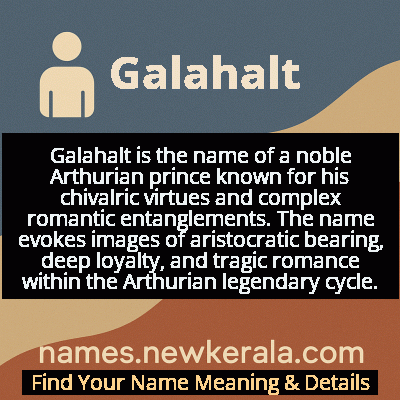Galahalt Name Meaning & Details
Origin, Popularity, Numerology Analysis & Name Meaning of Galahalt
Discover the origin, meaning, and cultural significance of the name GALAHALT. Delve into its historical roots and explore the lasting impact it has had on communities and traditions.
Name
Galahalt
Gender
Male
Origin
Arthurian
Lucky Number
8
Meaning of the Name - Galahalt
Galahalt is the name of a noble Arthurian prince known for his chivalric virtues and complex romantic entanglements. The name evokes images of aristocratic bearing, deep loyalty, and tragic romance within the Arthurian legendary cycle.
Galahalt - Complete Numerology Analysis
Your Numerology Number
Based on Pythagorean Numerology System
Ruling Planet
Saturn
Positive Nature
Ambitious, efficient, realistic, and authoritative.
Negative Traits
Materialistic, stressed, confrontational, and can be overly ambitious.
Lucky Colours
Dark blue, black.
Lucky Days
Saturday.
Lucky Stones
Blue sapphire, amethyst.
Harmony Numbers
2, 4, 6.
Best Suited Professions
Business leaders, managers, financial services, law enforcement.
What People Like About You
Leadership, determination, organizational skills.
Famous People Named Galahalt
Galahalt the Haughty
Arthurian Knight
Prince of Surluse and prominent knight of the Round Table, known for his role in the tragic romance between Lancelot and Guinevere
Galahalt of the Long Isles
Arthurian Prince
Ruler of distant islands who joined Arthur's court, celebrated for his diplomatic skills and tournament prowess
Galahalt the Younger
Knight Commander
Led a company of knights in the Quest for the Holy Grail, known for his unwavering loyalty to his companions
Name Variations & International Equivalents
Click on blue names to explore their detailed meanings. Gray names with will be available soon.
Cultural & Historical Significance
The character's evolution across different Arthurian texts demonstrates how medieval authors used him to explore the tensions between knightly honor, romantic passion, and political allegiance in feudal society. Galahalt represents the noble outsider who becomes integrated into Arthur's court while maintaining his distinct identity and values. His story has been interpreted by scholars as a commentary on the complex social dynamics of medieval aristocracy and the ways in which personal relationships could influence political outcomes. The enduring appeal of his character lies in his moral complexity and the tragic dimensions of his loyalty to Lancelot.
Extended Personality Analysis
Galahalt is typically characterized by his noble bearing, intense loyalty, and romantic sensibility. As a prince and knight, he embodies the chivalric ideals of courage and honor while displaying remarkable emotional depth and capacity for deep friendship. His personality combines aristocratic pride with genuine warmth, making him both respected and beloved among Arthur's knights. The name suggests someone who is charismatic and commanding yet capable of profound emotional connections. Galahalt's most defining trait is his willingness to sacrifice personal interest for friendship, as demonstrated in his relationship with Lancelot.
This creates a personality profile of someone who is both strong-willed and emotionally vulnerable—a leader who commands respect through both his martial prowess and his capacity for deep, sometimes tragic, emotional commitments. His character arc often shows growth from youthful arrogance to mature wisdom through painful experiences. Galahalt embodies the paradox of the confident leader who is nonetheless susceptible to deep emotional attachments that can override practical considerations. This combination of strength and vulnerability makes him one of the most psychologically complex figures in Arthurian romance, representing the medieval ideal of the complete knight who excels in both arms and emotional depth.
Modern Usage & Popularity
In contemporary times, Galahalt remains an extremely rare given name, primarily used by Arthurian enthusiasts, historical fiction authors, and parents seeking unique medieval names with literary significance. Its usage is almost exclusively confined to English-speaking countries with strong Arthurian traditions, particularly the United Kingdom and United States. The name appears occasionally in fantasy literature and gaming communities but has never achieved mainstream popularity. Modern bearers of the name often appreciate its aristocratic connotations and connection to chivalric romance, though its complexity and unusual sound prevent widespread adoption. Recent years have seen a slight increase in usage among parents interested in reviving medieval names, though it remains well outside the top 1000 names in any English-speaking country and is considered a distinctive choice for those deeply invested in Arthurian lore.
Symbolic & Spiritual Meanings
Symbolically, Galahalt represents the noble outsider who becomes deeply enmeshed in the central conflicts of a society. His name evokes themes of aristocratic duty conflicting with personal loyalty, the tragic consequences of romantic idealism, and the complex nature of friendship that transcends social boundaries. The character serves as a symbolic bridge between different realms and social classes within Arthurian society. Metaphorically, Galahalt embodies the 'catalyst' archetype—someone who facilitates major changes in others' lives while undergoing his own transformation. His story symbolizes how noble intentions can lead to unintended consequences, and how personal loyalty can sometimes conflict with broader social responsibilities. The name carries connotations of both pride and vulnerability, representing the paradox of strength tempered by emotional depth and the ways in which personal relationships can shape historical outcomes.

